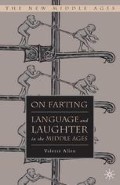Abstract
Here is a book about the body’s detritus, the wind, water, and solids that our intestines throw out daily. Beyond farts, its general preoccupation is with what people throw out. Worthlessness sustains the project throughout. Most irresistible of all garbage is scientifically obsolete bodies of knowledge: a geocentric universe, four humors, the doctrine of sympathies, alchemy, astrology; and what better repository for such rubbish than the Middle Ages? Itself the waste lot of redundant knowledge and “false” etymologies, the Middle Ages provides a vantage point from which to rethink modernity’s preoccupation with accumulation. Waste reveals more about those who threw it out in the first place than about the nature of the revolting. In dirt, observes one anthropologist, there is system.1
Access this chapter
Tax calculation will be finalised at checkout
Purchases are for personal use only
Preview
Unable to display preview. Download preview PDF.
Notes
John Trevisa, On the Properties of Things: fohn Trevisa’s Translation of Bartholomaeus Anglkus De Re Proprietatibus, ed. M.C. Seymour, Elizabeth Brockhurst, Gabriel M. Liegey, M.H. Blechner, Ralph Hanna III, Joseph E. Grennen et al., 3 vols (Oxford: Clarendon, 1975–1988), 7.49
Walter Benjamin, Illuminations, ed. Hannah Arendt, trans. Harry Zohn (New York: Schocken, 1968), p. 197.
Laurent Joubert, TraitÉ du ris (Paris: Nicholas Chesneau, 1579), 1.26
Julia Kristeva, Powers of Horror: An Essay on Abjection, trans. Leon S. Roudiez (New York: Columbia University Press, 1982), p. 69.
For a detailed critique of Platonically influenced medieval musical aesthetics and an examination of the “embodied materiality” (p. 4) of abstract number, see Bruce W. Holsinger, Music, Body, and Desire in Medieval Culture: Hildegard of Bingen to Chaucer (Stanford: Stanford University Press: 2001).
Quoted in Philippe Kohly, dir., Matisse, Picasso DVD (New York: Museum of Modern Art, 2003).
Caroline Walker Bynum, Fragmentation and Redemption: Essays on Gender and the Human Body in Medieval Religion (New York: Zone, 1992), p. 13.
Malcolm Jones, “The Parodie Sermon in Medieval and Early Modern England” Medium Aevum, 66 (1997): 101
Copyright information
© 2007 Valerie Allen
About this chapter
Cite this chapter
Allen, V. (2007). Introduction The Midden Age. In: On Farting. The New Middle Ages. Palgrave Macmillan, New York. https://doi.org/10.1057/9780230109063_1
Download citation
DOI: https://doi.org/10.1057/9780230109063_1
Publisher Name: Palgrave Macmillan, New York
Print ISBN: 978-0-230-10039-8
Online ISBN: 978-0-230-10906-3
eBook Packages: Palgrave History CollectionHistory (R0)

